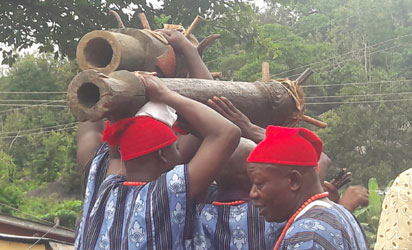
Like rivulets trickling down the cottage rack, the ancient community of Ujabhole in Irrua township of Esan Central Local Government area of Edo State attracts heavy human traffic in the Spring of every year.
Natives of this little but anciently valued community in Nigeria and indeed the entire globe can hardly compromise their annual participation in the dominant Aba Festival, celebrated annually in Ujabhole, where people from all walks of life, including non-indigenes and strangers converge to witness and enjoy.
The Aba festival, locals in Ujabhole informed, is such a crowd-pulling festival to which the entire community detour, as they describe it as the virtual benchmark for any administrative, ceremonial, and spiritual activity to be conducted among the people.
During the Aba annual festival, ‘sons’ and ‘daughters ‘ across the world gather in Ujabhole to partake in its revelry. According to sources, the festival is rich in oblations, propitiations and incantation chants, as it is common with other top-rate festivals in many Nigerian communities, especially in neighbouring Yoruba and Igbo ethnic stocks.
For instance, many Yoruba communities are renowned for celebrating Egungun (Masquerade) Festival periodically. That particular festival, according to recollectors, is a historical event that brings together, people from far and near, to see the proof of evidence of the Yoruba strong religious beliefs. Although, there are masquerades in Igboland too known as Maun, which dot virtually all festivals to add a tinge of entertainment.
Specifically, however, apart from Egungun, the Yoruba have other major festivals such as Ogun (god of iron) in Ondo community, Eyo in Lagos, Olojo in Ile-Ife, and Osun Osogbo in Osogbo, present-day capital of Osun State.
In Igboland too, there are dominant festivals such as Ikeji, New Yam, Ofala, and Odo.
Interestingly, the Tiv ethnic group of Benue State in Nigeria has yet a crowd-pulling annual communal revelry known as Kwagh-Hir Puppet Festival. It is reputed as a dramatised folklore of the Tiv people, with intense use of masquerades, puppet, and marionettes.
Up North in the Hausa/Fulani circles too, the Durbar Festival, dotted by glamorous horse-gliding flaunts amid flute-blaring and other musicals, dances and pyrotechnics, is most cherished. This is apart from the Argungun Fishing Festival which is a four-day event particularly in Kebbi State and some other Nigerian northern states.
In the case of Aba Festival in Ujabhole community of the Irrua principality of the Esan stock of Edo State, it is both interesting and solemn. Locals revealed to this correspondent that the festival is so much adored by natives to the extent that failing to attend it is regarded as a grave sin needing urgent atonement, otherwise they hold the belief that such is bad omen of ill luck, calamities, and tragedies.
It is similarly held that the unbroken attendance of annual Aba Festival would attract good luck, blessings from the ancestors, prosperity, protection against accident and other tragedies, and above all, fertility and safe-delivery for pregnant women in one’s household. Even the farmers’ union in the locality imposes severe sanction on their members not sighted in Aba Festival because they believe that partaking in the ceremony could ferterlise the land and give them high farm yield.
At the peak of celebration in the Aba Festival, animals like white goats and dogs are publicly beheaded in the belief that such would cleanse the land of transgression and spare it of calamities. They also see the rite as harbinger of good
Besides, the Aba Festival is also celebrated by the Igarra people in Akoko Edo Local Government area of same Edo State. Its ‘modus operandi’ include the beating of Aba drums and the Manhood Dance, widely known as Ututanebe.
As clear demonstration of the importance of Aba Festival to all and sundry in Edo State and beyond its shores, both the federal and atate governments are reputed to always give financial support to make the celebration of the festival thick and memorable. For instance, the last festivity was reportedly supported by the federal ministry of tourism and culture with a sum of N100 million, while the homestate also offered varied financial and logistic constributions.
As for this year’s Aba Festival, the natives of Ujabhole and the entire Irrua people of the Esan ethnic stock look forward to yet another edition of the remarkable communal reunion and frenzying celebration.